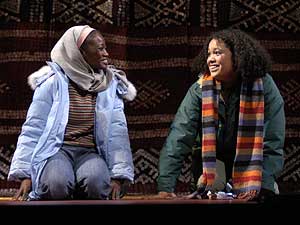|
Audio
Photos
Resources
Your Voice
|
CTC takes a snapshot of Somali-African American relations
March 26, 2004
A new play at the Children's Theatre Co. portrays the tension and occasional conflict between Somali immigrants and African Americans. "Snapshot Silhouette" examines this cultural clash through the eyes of two 12-year-old girls. One of the CTC's goals is to help launch a dialogue between the two communities in the Twin Cities.
Minneapolis, Minn. — The Children's Theatre Co. sits in the heart of the Whittier neighborhood in Minneapolis.
CTC Artistic Director Peter Brosius refers to Whittier as the Ellis Island of the Upper Midwest. One of the largest Somali populations in the country has settled in the Twin Cities, many of them in Whittier. When reports of high school fights between African American and Somali kids surfaced, as well as post-9/11 stigmatization of Somalis, Brosius decided the CTC needed to create a play.
"Knowing that when communities engage those crises, progress can be made, and when communities don't, they don't get better usually," Brosius says. "Things fester and they can be extraordinarily complicated."
 | |||
The CTC's play, Snapshot Silhouette, is set in a city not unlike Minneapolis. It's a portrait of a community that's undergone an ethnic and racial transformation. One scene takes place in an ESL or English as a Second Language class, where dozens of languages are spoken and the students are all multi-lingual.
At the heart of the play are two 12-year-old girls, one African American, the other Somali.
Tay C is the rebellious daughter of a Twin Cities single mom. She's recently lost her sister in a drive-by shooting.
Najma is a Somali refugee temporarily adopted by Tay C's mother. Najma's father and sister were killed in the Somali civil war and her mother is stuck there.
For security reasons, the U.S. has clamped down on the financial pipeline between Somali immigrants and their relatives in Africa. Tay C. and Najma share the same bedroom and over the course of the play, given the similar pressures they are under, their relationship reaches a breaking point.
 | |||
As their verbal sparring intensifies, Tay C. advises Najma to decorate her wall with posters of starving African children to remind her of home. Najma then slams Tay C's less than stellar performance at school.
Snapshot Silhouette provides glimpses at the nature of the friction between the two groups. Some African Americans may deride what they view as backward Somali cultural and religious practices and personal hygiene. Somalis are sometimes scornful of what they perceive as the African American work ethic, and the breakdown of the black family.
This cultural jabbing is familiar to Amanda Granger, who plays Tay C. Granger went to junior high in St. Paul with a lot of East African immigrants. Granger says the tension between Tay C. And Najma is real and destructive, just as it is between Somalis and African Americans.
"Working through that to a place of friendship and love and respect is a painful process," Granger says. "And it really takes a lot of hard work. It's not easy and it's not, 'Oh, we have something in common! Click! We're friends.'"
Sonja Parks, who plays Najma, places the strained Somali-African American relationship within the larger paradigm of race in America. Parks agrees the conversation that needs to take place is extremely difficult. She says it hasn't even happened between white and black Americans. She says maybe two fictitious 12-year-olds can set an example.
 | |||
"One of the things that's exciting about the piece is the opportunity to be part of the vessel, for sparking some dialogue," Parks says. "That maybe the thing that brings people to the table, with the honesty of the child, with the honesty of the 12-year-old and go, 'You know what? I do think this about you, and what do you think about me? And how do we dismantle those stereotypes, and how do we really get to the meat of the issue -- and yeah, OK, let's talk about racism.'"
According to the CTC's Peter Brosius, that dialogue is already happening. There have been a number of community forums, including one at Lucille's Kitchen in north Minneapolis. During the play's opening weekend, Brosius says a celebration happened in the lobby, with members of both communities sharing food, music and poetry. He acknowledges a play can't change cultural practices or politics.
"It's a ripple in a pond," Brosius says. "The festival Saturday night with music, poetry and food -- it's another ripple in the pond. Conversations in the lobby after the play, before the play are ripples in the pond. You know, I think that's what we do."
Snapshot Silhouette is on stage at the CTC through April 17.
|
News Headlines
|
Related Subjects
|

